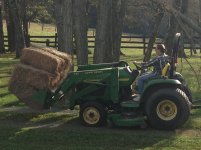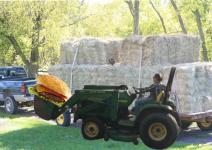FTC Cracks Down On Deere For Denying Right To Repair
Jan 16, 2025
#RightToRepair #JohnDeere #FTC
In a major development for farmers and consumers alike, the Federal Trade Commission (FTC) has taken significant action against agricultural giant John Deere regarding the ongoing "Right to Repair" debate. In this video, we break down the FTC's decision, what it means for John Deere, farmers, and the future of repair rights in the U.S. agricultural industry.
Yesterday, the FTC issued a landmark statement addressing John Deere’s restrictive repair policies that have long been a point of contention for farmers. The complaint centers around John Deere’s refusal to provide independent repair shops and farmers with access to necessary diagnostic tools, software, and parts to maintain and fix their equipment. For years, John Deere has been criticized for locking down access to the internal workings of its machines, forcing farmers to rely on costly, authorized dealerships for repairs and maintenance.
The FTC’s action is also seen as a victory for the growing "Right to Repair" movement, which advocates for greater transparency and access to repair tools and parts for consumers across industries.
Why Is This Important? For years, farmers have been at the mercy of John Deere's repair monopoly. The company’s refusal to allow users to repair their own equipment has left many farmers in a tough spot, with repair costs skyrocketing and equipment downtime leading to lost productivity. Farmers are also forced to pay for expensive repairs through John Deere’s authorized service centers, which don't always have the capacity for farmers' schedules, leading to delays during crucial planting and harvest seasons.
The issue goes beyond just inconvenience. Many farmers have expressed concerns about being unable to repair their own equipment in a timely and cost-effective manner. When tractors, harvesters, or other critical equipment break down, delays in repairs can result in significant financial losses, especially during peak seasons.
Farmers argue that the inability to repair their machinery—or even have independent repair shops do it—results in exorbitant costs, delays, and even forced obsolescence. The broader implications of the FTC's action against John Deere could lead to policy changes that will benefit not only farmers but consumers in many industries who are advocating for the same rights.
What Does the FTC’s Action Mean? The FTC’s move against John Deere could set the stage for more widespread regulatory changes across industries. For farmers, it represents a potential for significant relief. If John Deere is forced to comply with new regulations, it could pave the way for more affordable and accessible repair options.
The FTC’s decision also sends a clear message to other manufacturers that restrictive repair practices could face heightened scrutiny from regulators. It is a signal that companies cannot continue to monopolize repair services, limit consumer choice, or stifle competition in a way that harms the end user.
What’s Next for John Deere? John Deere has long been a symbol of agricultural machinery, but its practices regarding repair access have been highly controversial. With the FTC's action, the company may be forced to alter its approach to the "Right to Repair." While it's unclear what specific changes will occur, farmers and independent repair professionals are hopeful that it will lead to increased transparency and competition in the repair space.
As the situation continues to unfold, farmers and consumers should expect more public hearings, debates, and discussions about the Right to Repair, especially in the context of large, heavily regulated industries like agriculture. The FTC’s action may lead to new rules that require John Deere to open up access to repair software, tools, and manuals to anyone who owns one of its machines.
Farmers are encouraged to stay informed about their rights and monitor any future developments from the FTC regarding this case. With this recent action, there’s a chance that change is on the horizon for the agricultural sector. The "Right to Repair" movement is gaining steam, and the push for fairer access to repairs and services is growing stronger every day.
Stay tuned to this channel for updates on this developing story and more insights into the Right to Repair movement. Don't forget to like, comment, and subscribe to stay informed on all things related to agriculture, technology, and consumer rights.
17:52














